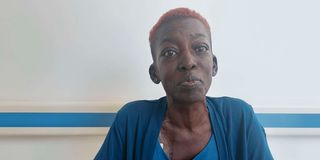‘Stop sending us to early graves’, terminally ill patients cry over SHIF chaos

Many patients are struggling to access healthcare in hospitals across the country following the transition from NHIF to SHIF.
What you need to know:
- When Nation.Africa arrived at KNH, hundreds of patients, many of whom are battling life-threatening conditions, filled almost all waiting areas.
- It is perhaps why the patients we eager to let us know that the biggest public referral facility in the region has only two dialysis machines.
Terminally ill patients struggling to get lifesaving treatment as hospitals demand cash because of challenges with the new health system have pleaded to government to revert to the National Health Insurance Fund (NHIF) system.
At the Kenyatta National Hospital (KNH) and Kenyatta University Teaching, Referral & Research Hospital (KUTRRH), the country’s two major referral facilities, patients are undergoing harrowing ordeals, unable to access urgent treatment under the Social Health Insurance Fund (SHIF).
“Under NHIF, dealing with chronic kidney disease in my case was much more manageable compared to the current predicament. NHIF used to deduct Sh8500 from my cover for each dialysis session because I need two per week. Now I am compelled to pay Sh11,000 out of pocket every week just to stay alive,” lamented Salome Kamau, a kidney patient at KUTRRH.
“The truth is SHIF has no tangible benefits,” she said, adding the hiccups occasioned by the Sh104.8 billion Integrated Healthcare Information Technology System (IHTS) that is not working as expected is adding insult to injury.
Ms Kamau needed urgent tests before a team of experts operates on her to remove gall stones, a delicate procedure according to Dr Onyimbo Kerama, the director of clinical services at KUTRRH.
The patient is also in dire need of dialysis and has to do two per week.
“Because she is a first time patient here, we have to do pre-dialysis tests. She has to pay out of pocket and they include blood, urine and imaging tests,” the medic said.
Dr Kerama explained the patient has to pay because what Social Health Authority (SHA) allocates in their renal package is not enough to cater for these tests as well as the consumables during dialysis.
“Before October 1, when I was going for treatment using my NHIF card, on three occasions I was admitted at KNH and NHIF sorted everything. I remember my first bill was Sh55,000, the second was Sh80,000 while the third one was Sh40,000. NHIF cleared everything,” a tearful Ms Kamau said.
“I was diagnosed in January 2020 and started my dialysis in February the same year because both my kidneys have failed to function. I have been to various dialysis centres from KNH to Kenusa Medical Limited, a Kenya-based social enterprise that builds and operates dialysis centers in partnership with mission hospitals and in this case Fatima Hospital in Rongai,” she recounted.
Fatima Hospital and Kenusa would part ways last year, a move that affected many patients on dialysis like Ms Kamau.
“Fatima was using up the monies both received from NHIF without refunding Kenusa and so Kenusa was unable to buy consumables we need, that’s the explanation they gave us,” she said.

Salome Kamau, a chronic kidney disease patient at Kenyatta University Teaching, Referral & Research Hospital.
“My health improved when I started my dialysis at Kenusa because they used to be very keen on iron maintenance with drugs like Venofar, a must have drug for patients with chronic kidney disease (CKD) as well as hemoglobin levels medication,” the patient added noting that when Kenusa left them in the hands of Fatima Hospital they were unable to deliver. Which is she resorted to seeking the lifesaving treatment she requires at KUTRRH.
She disclosed that the dialysis centres she has been to are not offering Apol injection and Venofar drugs for CKD patients because SHIF doesn’t cater for them.
“A hospital administrator explained to me that SHA did not consider the escalation of the economy when making many decisions which means every week I have to part with Sh 1600 for Venofar and the Apol injection,” Ms Kamau disclosed while narrating how CKD has robbed her of almost everything.
“My mother has paid for my last four dialysis visits because I am jobless and do not have money. I get by because of the kindness of my friends who donate cash to me. As we speak, my mother is under the knife for a very expensive lifesaving surgery,” the 50-year-old patient said.
The attendant at the lab had more frustrating news for the patient.
“We are very sorry, the line is too long as there are many other patients before you and the procedure your test results confirm you urgently need can only be slated for mid-December,” the attendant told Ms Kamau.
Outside KUTRRH, sleeping under a shade next to the oncology centre, is Stephen Karanja, a cancer patient who is angry and frustrated.
“I have been here since 6am but the SHA system is not working. They keep telling us that the system is down. I wonder what we did to offend President William Ruto for him to punish us like this,” Mr Karanja laments.
“At this rate I will die waiting because minus the tests I urgently require, doctors cannot attend to me,” he told Nation.Africa while disclosing that he and 15 other patients had fled KNH hoping KUTRRH would deliver but the SHA system keeps failing everywhere they do.
When Nation.Africa arrived at KNH, hundreds of patients, many of whom are battling life-threatening conditions, filled almost all waiting areas, just like we had witnessed at KUTRRH, patiently waiting for SHA systems to start working so that they could be served.
It is perhaps why the patients we eager to let us know that the biggest public referral facility in the region has only two dialysis machines.
“We were informed the two dialysis machines were not working when we sought to know why we were not being served on time. They also said their SHA system is not working well, which is why I accompanied my friend here,” Anthony Chege, another CKD patient said.
“The other big problem we have is that we must now dig from our pockets to pay for scans and other imaging services. Now I can’t even afford fare to come for treatment considering I have been walking from Kibera to KNH at least thrice every week,” he added.
“Life under NHIF was better, this honestly is pure madness. Why did they rush to move us to a system that is causing nothing but pain?” he posed.
This is the plight of many patients across the country.
According to the latest data by the Ministry of Health, in 2023, Kenya had 386,533 renal failure patients with the government spending Sh3,974,840,648 on their treatment, including surgeries.
Two weeks ago, in an exclusive interview with Nation.Africa, Safaricom developers disclosed that the government rolled out SHIF three months after signing a deal with the Safaricom-led consortium in August this year to build the IHTS from scratch for two years then roll it out for ten years before handing it over to the digital health agency (DHA).
Dr Job Nyameino, a medical doctor and digital health expert who leads Safaricom's team of nine experts that is composed of nine other leads, a mix of doctors and software engineers that are also in charge of smaller teams disclosed that the IHTS system has 17 components and required two years to build and as per the deal that was signed after which it had been scheduled to be launched in 2026, a year before President Ruto winds up his first term.
The new system is projected to raise Sh133 billion annually, a significant increase from Sh78.8 billion that was collected by NHIF in the financial year 2023/2024, according to Dr Samson Kuhora, the Head of Design and Benefits Management at SHA.
He explained that their estimates assume that 85 per cent of the population will be reached once the new SHIF system is fully functional and at least 70 per cent of the disease burden will be covered.
The hurry to transition from NHIF to SHIF after these projections is perhaps the reason the system is not working as the government had envisioned.





